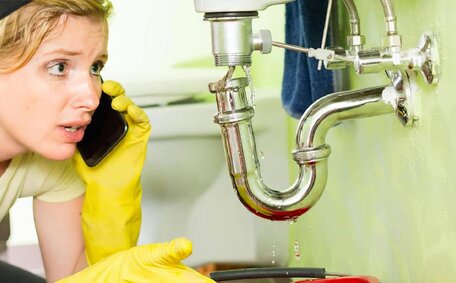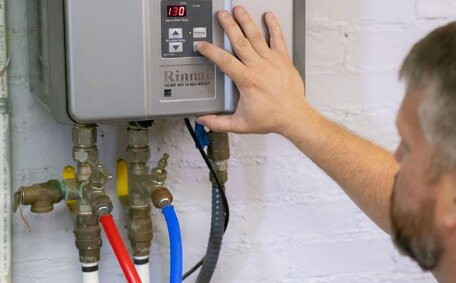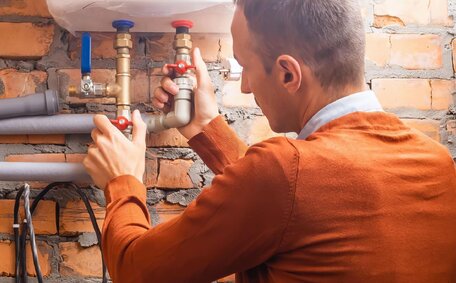Introduction to DIY gas fitting
The DIY trend in home improvement projects is renowned for its cost-saving benefits and personal fulfilment. However, caution is essential when working with gas due to significant safety concerns and legal restrictions. Simple tasks such as replacing washers on gas taps may be DIY, but most gas fitting tasks require certified professionals.
Improper handling of complex natural gas system components can result in serious high-pressure plumbing issues. Gas leaks or faulty appliances can have dangerous consequences that severely jeopardise home safety. Strict regulations govern gas work to safeguard lives and property.
Taking on household tasks independently is commendable; however, DIY gas fitting presents significant risks without proper training, licensing, and can potentially cost more in the long run.
However, minor gas-related tasks can sometimes be DIY-friendly, depending on local regulations.
DIY may be allowed for tasks like replacing established gas connectors, tap fittings, or pipe sections. However, installations, renovations or modifications to the broader system still require accredited gas fitters known in your local area for your diy plumbing work. If in doubt, check with your local state authorities before embarking on any gas-related plumbing or DIY projects.
This article outlines which gas fitting-related plumbing tasks can and cannot be safely and legally undertaken as DIY projects. We’ll also provide tips on how to evaluate which ones among your DIY capabilities are suitable when handling plumbing projects involving gas, and when it’s essential to get into contact with a professional.
Identifying simple gas tasks for DIYers
When it comes to gas fitting, there are a handful of minor projects you might do want yourself that may legally fall into a DIY grey area. Replacing an existing washer on a gas tap is generally permissible. Attaching a gas appliance using existing connectors to connect gas pipe in good working order can also potentially be DIYed.
However, modifications or additions to gas pipes or water lines should always involve licensed professionals. Installations, renovations or plumbing works to your gas system should only ever be done by accredited gas fitters, no matter how simple the job may seem.
Here are some gas tasks you might manage yourself, within your capabilities, if local regulations permit:
- Conducting plumbing repairs like replacing a pilot light thermocouple
- Fix your plumbing by changing gas connectors on appliances
- Fixing a leaking gas tap body by replacing worn tap washers
- Reconnecting existing gas appliances, such as kitchen stoves or dryers, after relocating
Before attempting any gas-related tasks, ask these key questions to assess DIY suitability:
- Does the task only involve swapping out existing parts without modifying pipes/supply?
- Do I have the right tools and understand exactly what needs to be done with the right materials?
- Does my local council confirm this task may legally be DIYed?
Should there be any uncertainty, it’s vital to consult a professional gas fitter for safe and precise task completion. Gas leaks pose extreme safety risks to occupants and your homes. Illegal DIY gas work can also risk insurance claims and legal prosecution if regulations are breached.
The risks and limitations of DIY gas work
DIY gas work carries major safety risks that can have severe consequences. Given that gas systems operate under high pressure, leaks or malfunctioning appliances could result in fires, explosions, carbon monoxide poisoning, and other catastrophic incidents.
There are strict legal regulations around gas work to protect lives and properties. Professionals earn their gas fitting licences through extensive training and certification for valid reasons. Improper gas connections, damaged pipe fittings, or substandard repairs can swiftly turn into safety hazards.
It’s essential to accurately gauge your DIY capabilities regarding gas systems. While simpler tasks like changing a washer may be legally grey areas, you must follow local council rules.
Anything involving modifications to existing gas pipes or supply should only ever be handled by accredited professionals, no matter how easy it may appear.
Illegal DIY gas work can risk insurance claims for water damage being denied. It can also lead to heavy fines or legal prosecution if regulations are breached and injuries or accidents occur. For plumbing repair involving gas systems, there’s no bypassing the need to follow building codes and permits.
Before initiating any seemingly straightforward DIY gas tasks, remember there are severe consequences if not executed safely and in compliance with the law. One’s limitations around gas must be honestly evaluated before starting any DIY. Uncertainty necessitates contacting a plumber to guarantee compliance, safety, and coverage.
Safety hazards
DIY gas work poses several key safety hazards that must be carefully prevented. Incorrect installation, especially when working with steel pipe fittings, is a major risk that can lead to disastrous gas leaks or appliance issues. Using the wrong materials or tools is equally dangerous.
To prevent accidents with minor DIY gas tasks, be sure to:
- Ensure you have the correct stainless steel fittings, such as two 90-degree elbows and fittings, for your particular appliance or fixtures. using substandard or faulty pipe fitting connectors can notably increase gas leak risks.
- Confirm all fittings are safe and gas-rated, such as yellow gas-rated Teflon tape. Unsuitable products can degrade over time.
- Only use specialised gas tools designed explicitly for the task. Improvised workarounds with ill-fitted materials can fail dangerously.
- Have a gas leak detector spray solution on hand to routinely check for any leaks or issues.
- Work slowly and methodically. Rushing increases the chance of errors.
- Thoroughly research and know what need to be done beyond simply watching online videos prior to starting work.
- If in doubt about the proper procedure or material suitability, call a plumber instead of risking safety by attempting to construct your own gas fixtures.
To prevent direct installation issues, follow gas safety practices strictly to mitigate fire or carbon monoxide risks:
- Ensure adequate room ventilation when working on gas fixtures or appliances.
- Never obstruct or seal permanent ventilation points in your home.
- Always turn off the gas supply at the meter before any work and use a gas detector afterward to confirm that all fittings are sealed before restoring the gas supply.
- Regularly inspect flexible gas lines and fixtures for wear and promptly replace worn sections throughout your home.
- Install and maintain CO alarms in any room with gas appliances.
In summary, DIY gas jobs warrant extra precautions. Knowing when safety hazards and limitations to consider before acting prevents accidents. When in doubt, engaging professional plumbers is the safest choice for gas system tasks.
Meeting regulations and compliance
To ensure safety, gas fitting work must conform to stringent regulatory and compliance standards. In Australia, all gas fitting work requires licenced professionals accredited under AS/NZS 5601.1. These laws exist to detail what can prevent risks of fire, explosion, or carbon monoxide poisoning from faulty workmanship.
In New South Wales, where Ashfield Plumbing is based, the gas work legislation comprises:
- NSW Gas Supply Act 1996 and Gas Supply (Safety and Network Management) Regulation 2013
- NSW Gas Fitting Certification Rules 2021
- NSW Gas Pipe sizing Table AS/NZS 5601.1:2013
- Building Code of Australia Gas Installations Standard AS/NZS 5601.1
These regulations encompass certification, training, materials, tool usage, testing, inspection, and correct installation procedures. There are also laws regarding room ventilation for gas appliances.
Crucially, make sure to realise that insurance claims may be denied if unlicenced personnel carried out illegal gas fitting. Homeowners can face major fines or legal prosecution for breaching regulations if accidents occur.
Compliance entails maintaining current gas certifications, recording all work, and using materials approved by law, installed by qualified professionals.
Even DIY projects, such as installing a rainwater tank or managing gas, must comply with local council rules designed for licensed plumbers. Upon any uncertainty, consult Ashfield Plumbing for authoritative advice and solutions that adhere to all Australian standards for your project.
When to call a professional gas fitter
Engaging a professional licensed plumber is crucial for tasks involving the modification, installation, or repair of gas pipes, lines, or systems. This includes:
- On one side, install new gas line systems or pipes
- Relocating or extending existing gas pipes as part of your renovation
- Adding gas outlets
- Converting electric appliances to gas
- Repairing or servicing gas appliances like hot water heaters beyond basic maintenance
- Any work needing to turn off building gas supply at the metre
Such plumbing projects demand technical expertise, specialized tools and materials, and strict compliance with legal codes and standards. Improper work risks severe consequences, and you could end up with water leaks, gas leaks, fires, or explosions.
More broadly, if ever unsure whether a job exceeds DIY capabilities, projects can benefit from the expertise of a licenced professional. Simple plumbing jobs can still go wrong without the right expertise. For total confidence and safety, accredited gas fitters should handle any complex or unfamiliar gas work, ensuring the job doing is done correctly.
Our fully certified gas specialists at Ashfield Plumbing, with up-to-date training, comply with all NSW regulations and can advise on what you can legally and safely DIY and when you should hire a professional. For complex projects, do not hesitate to seek professional assistance.
Choosing a licensed professional gas fitter
Opting for a reputable, licenced professional gas fitter is crucial to ensure the safety and efficiency of your water systems. Here are some essential factors to consider when choosing a professional gas fitter:
- Credentials and certifications: Check that gas fitters who plumber do your gas fitting hold the necessary qualifications and licences, such as a gasfitting licence or certificate III in plumbing. This confirms they possess the required knowledge and skills to work with gas systems safely and efficiently.
- Experience: Look for a gas fitter with substantial experience in handling all kinds of gas projects, from minor repairs to significant installations. An experienced gas fitter who can identify potential issues will have more than a deep understanding of the intricacies of gas systems.
- Local reputation: Research the gas fitter’s reputation within your community. Read reviews, ask for references, and consider word-of-mouth recommendations from friends, family, and neighbours. A reliable plumber for your needs should have a solid track record with satisfied customers and successful projects.
- Transparent pricing: Ensure your gas fitter provides clear, upfront pricing to fit your budget for their services. This helps you avoid unexpected costs and make informed decisions about your gas system maintenance and upgrades.
- Availability and response time: Choose a gas fitter who can promptly address your needs. A responsive gas fitter will be available when you need their services and minimise disruptions to your daily routines.
When you need a gas fitter you can trust, email us, call us, or schedule an appointment today.






